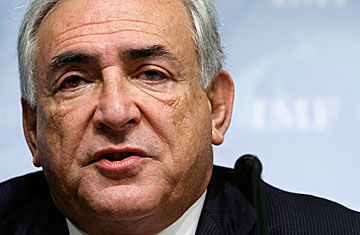
IMF Managing Director Dominique Strauss-Kahn
The Director General of the International Monetary Fund (IMF) Dominique Strauss-Kahn has saved his skin. Now, many people wonder if he'll save the world.
Nearly a week after news broke that the IMF had contracted a Washington D.C. law firm to investigate whether Strauss-Kahn had abused the power of his job in dealing with an avowed affair with a co-worker, the organization's Executive Board cleared the Frenchman of any dismissible violation of ethics codes. In doing so, however, its members made their disdain of Strauss-Kahn's adulterous behavior clear. In a statement released late Oct. 25, the Board said the independent inquiry "concluded that there was no harassment, favoritism, or any other abuse of authority." But it went on to note "the incident was regrettable and reflected a serious error of judgment on the part of the managing director."
Humbled and no doubt shamed by the world-wide attention the now infamous fling attracted, Strauss-Kahn echoed similar sentiments in responding to the finding, saying "I very much regret the incident and I accept responsibility for it."
Officially, that closes the book on the matter, which arose from a brief relationship that Strauss-Kahn initiated in January with the IMF's then-head of its Africa department, Hungarian economist Piroska Nagy. Now the question is whether the former French Finance Minister and Socialist Party presidential hopeful can move past the considerable distraction the scandal has caused, and turn to the rising chorus of voices calling to make the IMF central to the world's effort to face the surging financial and economic crisis.
On Friday, for example, officials at the Asia-Europe Meeting in Beijing looked to the Nov. 15 international summit in Washington to begin reforming the global financial system with a call to pump up the IMF in managing the situation. "Leaders agreed that the IMF should play a critical role in assisting countries seriously affected by the crisis, upon their request," a concluding statement urged.
That's already happening as the IMF assumes its more traditional function of providing funds to cash-strapped nations confronting turmoil. Late last week, for example, the organization struck a tentative agreement to extend Iceland a $2 billion loan; similar accords are expected to be made with other countries badly in need of economic stability amid the current upheaval, including Hungary and the Ukraine. Nations with more stable economies that are badly hurting for access to foreign currency like South Korea and Brazil, meanwhile, may also soon turn to the IMF for help.
But many leaders-particularly French President Nicolas Sarkozy, and British Prime Minister Gordon Brown-want to go beyond that activity and place the IMF at the center of a reformed, unified, and better-regulated global finance system. Sarkozy has gone so far as to call for the "moralization of finance markets" and "re-foundation of capitalism". Though the most rabid adepts of laissez-faire systems like the U.S. are expected to rebuff such efforts to impose international strictures, Strauss-Kahn's profile as a respected economist and market-friendly leftist leaves him in a rare spot: The head of an international agency about to extend its powers that political and business leaders on both sides of the Atlantic and Asia feel they can deal with.
That credibility, however, seriously suffered from the uproar over Strauss-Kahn's affair. That will leave him with the difficult challenge of taking up the leading role many global politicians now call for the IMF to assume, even as many of his own staffers-particularly women-continue to regard Strauss-Kahn with resentment and disdain. Proving his reformist talents in a time of crisis as he also demonstrates unimpeachably monogamous behavior will not only be vital for Strauss-Kahn to up the IMF's role in a re-regulated international finance system; it may also be essential to his hopes to win the Socialist candidacy to challenge Sarkozy for the Elysee in 2012.
"The risk for Strauss-Kahn is that this thing may be dragged out again as campaigning starts to raise questions about his responsibility and stability," says Laurent Joffrin, editor of the left-leaning daily Liberation. That threat is especially true given Strauss-Kahn's long-standing reputation in France as a man with formidable and proven powers of seduction.
French reaction to Strauss-Kahn's IMF trouble has generally called it a reflection of notorious puritanical American social obsessions that extend into the private affairs of public figures. Perhaps, but the so-called "people-ization" of politics in France--and accompanying media willingness to offer up formerly off-limits details of politicians' lives-considerably raises the possibility of sex and dalliances becoming game-changing concerns in future French elections. However, throwing that first stone may be perilous, "because this kind of thing isn't reserved to Strauss-Kahn, or even the left, since we know many conservatives go astray," Joffrin notes. "And not just in France-it the U.S., too."
